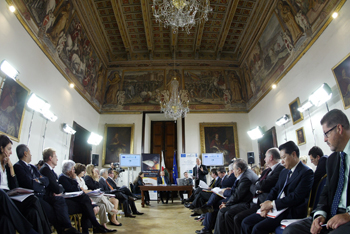UNDP Parliamentary Debate



Parliamentary Debate about the MDGs and Development Cooperation
Organised by | With the Support of |
 |  |
SOS Malta | Ministry of Foreign Affairs |
at the House of Representatives, Valletta
Friday, 19th October 2007
This project is financed by the European Commission and implemented by the United Nations Development Programme (UNDP)
As new and emerging donor countries, the twelve New Member States within the European Union are to play a significant role in helping achieve the Millennium Development Goals through their commitment to MDG 8 by expanding their development cooperation, and increasing the volume and the quality of the aid that they provide to developing countries.
In 2007, the UNDP and the European Commission collaborated on raising awareness and building support for the achievement of the MDGs in the new Member States, including Malta. This was done through the organization of parliamentary debates on the MDGs and development cooperation in the various countries. These debates formed part of the efforts by the UN, the EU and other organizations to take stock of the status of achievement of the MDGs at mid-point and promote the European Development Days.
SOS Malta was the Maltese organisation assigned with the task of organizing the Parliamentary Debate in Malta. The event was financed by the European Commission and implemented by the United Nations Development Programme (UNDP). It was also supported by the Maltese Ministry of Foreign Affairs.
The Parliamentary Debate, held on the 19th of October 2007, was attended by Maltese MPs and MEPs, UNDP representatives, EC representatives, civil society representatives, journalists, and academics.

The Parliamentary Debate – held at the Palace housing the Maltese House of Representatives.
The running theme throughout the event: increasing public awareness and ownership of the MDGs and development issues.
The first part of the programme consisted of a Parliamentary Debate with a total of 60 participants including MPs, MEPs, UNDP representatives, EC representatives, civil society representatives, journalists, and academics. Speaker Profiles. The programme for the Parliamentary Debate focused on three main aspects:
- International - commencing with an introduction to the MDGs and the progress made internationally towards achieving the MDGs by 2015. A discussion will then take place about the feasibility of the MDGs and what needs to be done in view of reaching the 2015 targets;
- European - providing participants with insight about the role of the EU in development. It will also provide information about the degree of ownership of MDGs by EU citizens and the simultaneous importance being given to awareness-raising at EU level;
- National - focusing on Malta’s development policy as well as the degree to which development education and awareness-raising in Malta is actually being promoted.
[The full programme can be downloaded].
The proceeds of the Parliamentary Debate were documented and a report, including the recommendations put forth on the day, will be presented to the Maltese Parliament as a motion towards an enhanced national development policy.
Programme
Click here Brochure English | Maltese
Bill boards image Click here
Presentations and interventions during the Debate:
Opening Speech -Hon. Minister Dr. Michael Frendo, Ministry of Foreign Affairs
What are the Millennium Development Goals? Mrs. Claudia Taylor East- Director SOS Malta
Intervention - The United Nations Millennium Development Goals Report 2007 Dr. Omar Grech, Mediterranean Academy of Diplomatic Studies, University of Malta
Intervention - Professor David Hulme, Associate Director, Chronic Poverty Research Centre; Deputy Director, ESRC Global Poverty Research Group; Associate Director, Brooks World Poverty Institute; Senior Research Fellow, Leverhulme Trust
Intervention - Mr. Jacek Cukrowski, MDG Advisor at UNDP Bratislava Regional Centre
European Development Policy – How is Europe contributing to the MDGs being achieved by 2015? Mrs. Françoise Moreau, European Commission, DG Development & relations with ACP States, Unit A1 - Forward looking studies & Policy coherence
The European Parliament and the Midway Point of the MDGs Mr. Ryszard Czarnecke, Member of the European Parliament, Member of the Development Committee to the European Parliament
The European Citizen’s Awareness about the MDGs - Dr. Simon Busuttil, Member of the European Parliament
European Development Days – why are they important and what is the role of Member States in such regard? - Mr. Edward Demicoli, European Commission’s Representation Office in Malta
How does Malta proactively support the MDGs? What is its role in development cooperation? How should Malta seek to contribute to the MDGs until 2015?
Interventions by:
• Intervention Ministry of Foreign Affairs PRO Mr Mario Sciavone
• Intervention Hon. Leo Brincat MP, Main Opposition Spokesperson for Foreign Affairs & IT and Member of the Standing Committee on Foreign and European Affairs
• Intervention NGDO Platform Mr Vincent Caruana
Ownership of MDGs in Malta – is there need for increased development education and public awareness raising?
Interventions by:
• Intervention Hon. Minister Dr. Louis Galea, Ministry of Education, Youth and Employment
• Intervention Hon. Carmelo Abela MP, Deputy Speaker, Spokesperson for the Opposition on Education, Culture and Youth
• Intervention Ms. Vanya Walker-Leigh, Economist and Journalist, 'Sunday Times of Malta' correspondent
SCHOOL AND UNIVERSITY PRESENTATIONS
Presentation about the MDGs and Malta’s development commitments as a New EU Member State – delivered by Philippa Arrigo and Mark Rizzo at San Anton School.
Apart from the Parliamentary Debate, SOS Malta also organized a few side events. These included the organisation of TV and radio discussions, as well as presentations and lectures at schools and university.
Brochures and a DVD were also produced and disseminated among stakeholders and the media.